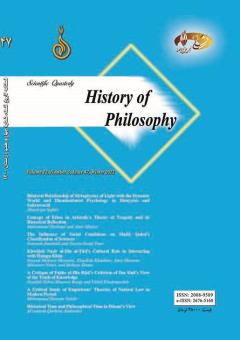-
-
List of Articles
-
Open Access Article
1 - Editor's Note
Hossein Kalbasi Ashtari -
Open Access Article
2 - Bilateral Relationship of Metaphysics of Light with the Dynamic World and Illuminationist Psychology in Dionysius and Suhrawardī
Abdolreza Safari -
Open Access Article
3 - Concept of Ethos in Aristotle’s Theory of Tragedy and its Historical Reflection
Mohammad Hashemi Amir Maziyar -
Open Access Article
4 - The Influence of Social Conditions on Mullā Ṣadrā’s Classification of Sciences
Fatemeh Jamshidi Nasrin Serajipour -
Open Access Article
5 - Khwājah Naṣīr al-Dīn al-Ṭūsī’s Cultural Role in Interacting with Hulagu Khān
Seyyed Mohsen Hosseini Einullah khademi Amirhosein Mansori Noori mohsen shams -
Open Access Article
6 - A Critique of Fakhr al-Dīn Rāzī’s Criticism of Ibn Sīnā’s View of the Truth of Knowledge
SeyedehZahra Mousavi Baygi Vahid Khademzadeh -
Open Access Article
7 - A Critical Study of Empiricists’ Theories of Natural Law in Modern Period
Mohammad Hosein Talebi -
Open Access Article
8 - Historical Time and Philosophical Time in Ibrahimi Dinani’s View
M‘asumeh Qorbani Anderehci
-
The rights to this website are owned by the Raimag Press Management System.
Copyright © 2017-2026







